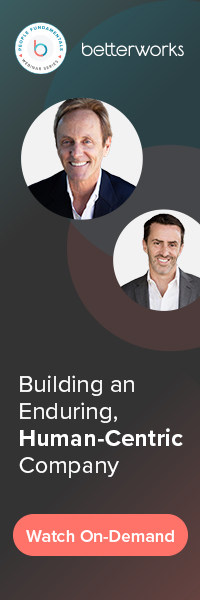Driving performance isn’t just about pushing people to do more: It’s also about design. A well-designed, purpose-driven performance management process supports better outcomes.
The fundamental driver of performance is empowering and trusting people, said renowned HR analyst and “Irresistible” author Josh Bersin during a recent session of Betterworks’ People Fundamentals webinar series. And after seven years of research into what makes businesses irresistible, Bersin’s learned a few things about what drives performance.
“You have to believe that every single person in your company wants to do more and wants to do better,” Bersin said. “And if they’re not performing at a high rate, it’s not because they don’t want to — it’s because there’s something getting in their way.”
Catch the highlights of the conversation between Josh Bersin and his friend Ben Putterman, vice president of learning and talent development at Rivian, as they discuss performance management, scaling culture, and HR’s role in keeping the “human” in human resources.
A series of meaningful interactions
Great performance doesn’t just happen. You need deliberate intention and effort to draw out people’s best work. “We do put a lot of time and intentionality into the way that we talk about performance in the company,” Putterman said.
Rivian takes a holistic approach to performance management that’s “shaped by a series of meaningful human interactions on a regular basis,” Putterman said. Technology that enables transparent conversations aids this approach.
“Within our company, we believe in conversation, we believe in transparency,” Putterman said, and hosting performance conversations through Betterworks’ platform makes that possible.
One of the biggest challenges of performance management is determining how heavy or light a touch you want managers to have. Rivian is experimenting with different tempos for goal-setting and check-ins to see what works best for them.
More than a job
Scaling a high-performance culture isn’t easy, and a lot of that work comes down to managers. One of HR’s biggest challenges is preparing managers for this challenge. “Becoming a manager is not a gift or a privilege,” Bersin said. “It is a responsibility.”
Management isn’t a new job, Bersin added, but a new career. “Managing people is a totally different type of job than being an individual contributor,” Bersin continued, “and so there are things that individual contributors are just not aware of when they move into that role.”
Because managers have such an impact on their reports, things can go awry when these leaders aren’t adequately prepared. “Managers, whether we like it or not, create microcultures,” Putterman said. One of the challenges that creates is aligning micro-cultures with the overall company culture.
The Rivian team believes that managers are smart, capable, and want to do the right thing — and that sentiment drives the company’s manager development program. “That really is our starting point for the way that we think about how we talk to managers, engage with managers, and develop our managers,” Putterman said.
Starting from a place of positivity and faith in middle management helped Rivian scale its culture during a period of exponential growth.
“We do try and manage to the highest common denominator, not the lowest,” Putterman said. Set clear expectations for managers — and trust them to be smart, capable people who’ll do the right things.
Taking a human-centric approach
HR needs to put humans front and center, even when it’s easy to get lost in the business strategy and the “resources” part of human resources, Bersin said.
Instead of reducing productivity to a metric, for example, think deeply about what productivity means to a business. “Are we generating the right amount of profit, at the right rate, given our growth rate?” Bersin said. “And where are we in our business cycle compared to our competitors and compared to the economy?”
Achieving business goals is about setting realistic expectations for your workforce. “We have to take this economic measure that the company is trying to hit, [and] we have to look at how we’re going to make that happen,” Bersin said.
Sometimes that approach requires HR to remind company leaders that every decision affects real people. “It is hard to run a company, it is hard to run a team, it is hard to be a manager — it is hard to make the right decisions,” Bersin said. HR must call out unfair decisions that don’t align with company values.
With a well-designed, human-centric performance management program, HR leaders can empower their people to achieve more.
Check out the on-demand recap for the entire conversation.
Building and Enduring Human-Centric Company






